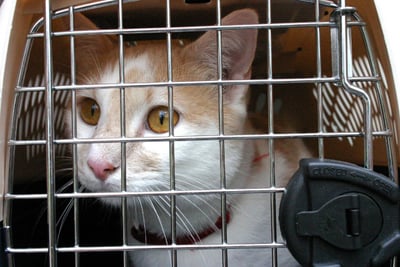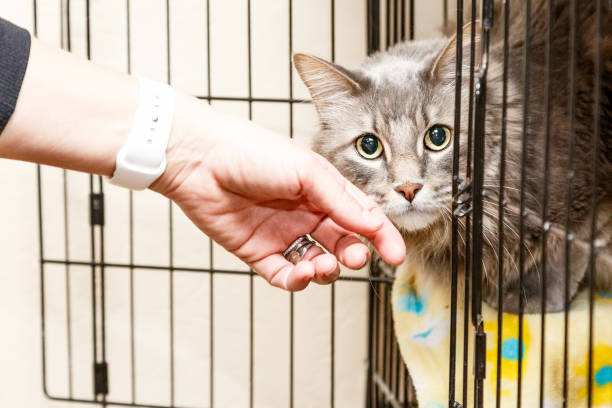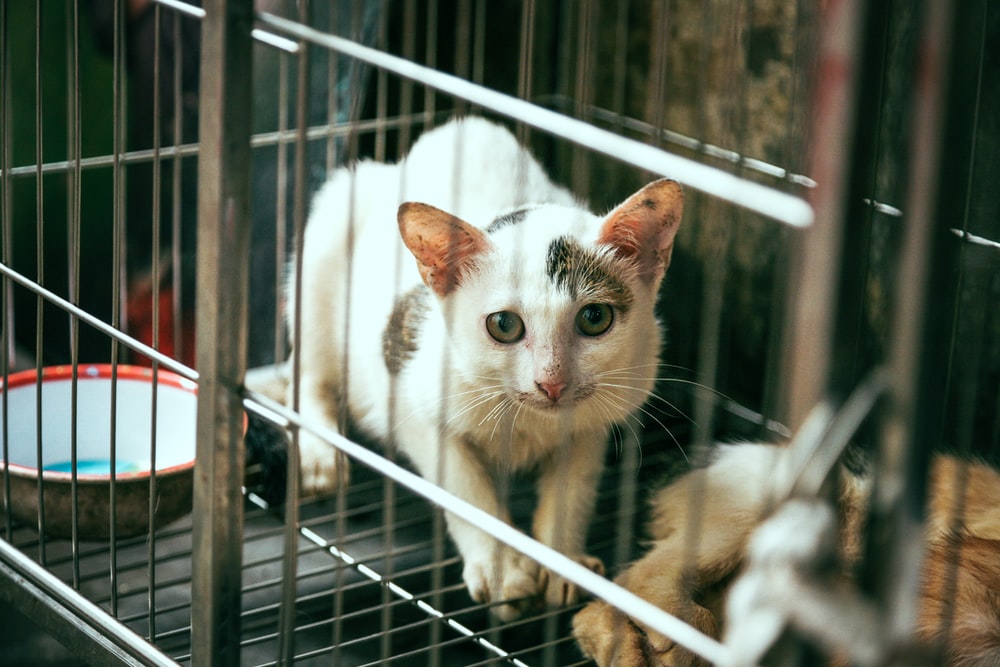Does your kitty hate the idea of being caged?
You are not alone. There’s a long list of cat parents whose fur babies cannot stand any kind of enclosure.
When placed in one, they will meow and yowl until they are let out.
But there are good reasons we put our cats in cages sometimes. From vet trips to family vacations and litter box training, crates can be beneficial to felines.
But what if your cat cries non-stop when you box her in?
For one, seeing your little furball in agony is quite heartbreaking. The meowing is bound to get to you.
Secondly, loud vocalization can be very inconvenient. If you are trying to sleep at night, it can interrupt your sleep and upset you in the process. The same happens when taking a trip.
So what can you do?
We have a few suggestions below.
Why Do Cats Meow When Put In Cages?

Knowing what to do to alleviate cat meowing starts with understanding what is causing the behavior in the first place.
There are several reasons your kitty cries when placed in a cage. Some of them are listed below:
I. To Ask To Be Freed
According to the ASPCA, cats meow when they want to be let out of a specific place.
For instance, when your kitty needs to eliminate outside in the morning, she will meow outside your door.
Once she’s done, she will use the same form of communication to be let back in.
If your kitty is one of those that loathe caging, she will certainly meow when she’s put in one.
If nothing is done, the noise will go to another level. The cage prevents her from exploring her vast environment and she doesn’t like it one bit.
II. Attention-Seeking Behavior
Although cats are more independent than our canine buddies, they also enjoy the company of people and other animals.
When left alone for too long, they can easily get bored and desperately seek attention.
Some have this feeling in a crate or cage far away from the sight of their human parents.
They will meow to ask you to come over and hang out, play, and pet them.
III. To Signal Hunger
Food is a big deal in the feline world. When a cat is hungry, do not expect her to be quiet about it.
As a creature of habit, she knows when her feeding times are almost.
If no food comes by, the cat will alert you by meowing endlessly.
If the meowing happens at night, chances are that the kitty is hungry and wants a snack or food.
IV. Injury or Sickness
Cats rarely let you know when they are in pain but sometimes, it becomes too much to hide. Here, the meowing is bound to kick in.
Before you dismiss your cat’s cry as nothing to be worried about, you might want to find out if she’s in pain or not.
Perhaps she injured her foot while playing outside or is suffering from an illness of sorts.
What to Do?

Now that you are aware of some of the causes of a cat meowing in a cage, what can you do to ease the behavior?
1. Get The Cat Used To The Cage
Big changes don’t sit well with most cats. In case you are using a cage for the first time, take the process of caging slowly.
You want the kitty to associate the cage with something nice like food or treats.
Long before you throw her in, take a few days to get the kitty used to the carrier or box.
Place it somewhere near her sleeping area and invite the kitty to climb on it. Let her go in on her own terms.
2. Use An Incentive
In a perfect world, your cat will get used to the idea of a cage during the first attempt.
However, we live in the real world where most cats need a push to do what we want them to do.
To get your cat accustomed to caging, bring out your best guns. Using catnip is a great idea if your kitty is a fan. Add it inside the carrier and let her find it for herself.
You can also use food to your advantage. During mealtimes, place the cat’s food bowl inside the cage and leave the door open.
Again, let her go in and discover the treat without you forcing her.
Once the kitty is comfortable in the cage, close the door for a time and see her reaction.
3. Make The Cage Cozy
A cold and uncomfortable carrier is not very inviting to a cat.
You want to make it a paradise of sorts so that she can tolerate if not enjoy being in there.
Keep it as clean as you can and line it with soft bedding. Additionally, place the cage on top of a soft pillow for extra comfort.
Even if the cat doesn’t like being kept in there, the plushness of the cage will keep her calm.
4. Offer Entertainment
As mentioned before, a bored cat is notorious for meowing non-stop.
You can help things by creating entertainment options for the pet.
Get creative and tie a string with a ball at the top of the carrier. Let it float near the cat so he can play with it when he’s bored.
You can also bring in a Ping-Pong ball or stuffed animal that is safe for her. These can reduce her boredom and alleviate meowing to a great extent.
5. Cover the cage
Sometimes placing a cover over the cage can help calm a stressed caged cat.
Cats, in general, enjoy being placed in dark quiet places when they are anxious.
They feel a sense of calmness as they are not too exposed.
As long as there are air holes for breathing, you can throw a cover or two over the cat’s carrier.
6. Give The Cat Some Food
Even if you think that your cat is full, it won’t hurt to confirm if she needs a top-up or not.
This is especially essential if she keeps making noise in the middle of the night or during a long trip.
Cats love to bite on something several times during the day. While you are at it, check if her litter box needs changing.
7. Offer Attention Wisely
Before you go to bed (for cat owners who put their cats in cages at night), create time to play with your kitty. Groom her, play with her, and pet her soft coat.
This assures her that she’s not abandoned. Do the same before a long trip and during any breaks.
8. Ignore the meowing
This sounds counterproductive but it actually is a solution to excessive cat meowing.
The goal of your kitty’s vocalization is to get you to do what she wants.
If you respond to her cry for help, you are sending the message that she’s the boss. This reinforces the behavior even more.
Instead, ignore the meowing and act only when the cat is quite calm. That will tell her that making noise isn’t the solution.
Parting Thoughts
Meowing is a cat’s way of communicating. Cat parents appreciate it as it gives them clues on what is going on with their pets.
However, when it happens too much, it can be overbearing.
If your kitty won’t stop crying in her cage, try the strategies mentioned here.
If nothing works, contact the experts.
Related Posts:

Hi! I am Eleanor Price. I started this website after my cat, Louie, almost died from a case of botulism (a type of food poisoning often caused by bacteria that grow on food items). Turned out that my cat’s diet was the problem. I have made it my duty to provide the best information and recommendations about everything cat lovers need to know about their felines’ health and wellbeing. My goal is to find the most informative content on anything feline-related and share it with fellow hardworking kitty lovers.

